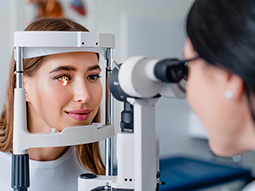What are cataracts?
A cataract is a clouding of the eye’s lens. The lens is a transparent structure within the eye, located behind the iris, that plays an important role in focusing images. A healthy lens is composed of an evenly arranged layer of water and proteins. Cataracts form when these proteins begin to clump together. As cataracts develop, the lens becomes milky, yellowed, or brown. Cataracts can cause vision impairment.
Cataracts are one of the most common types of eye conditions, and our MedStar Health’s ophthalmology team has successfully treated thousands of cataract patients. You can feel confident that our expert clinicians will provide you with the excellent care that your eyes deserve.
Cataracts
When cataracts occur, the lens of the eye becomes cloudy or opaque - preventing light from passing clearly to the retina.
Causes and symptoms of cataracts
Causes:
Cataracts are often caused by aging. Other causes include traumatic eye injury, surgery to treat other eye problems, diabetes, cancer treatment radiation, medications, smoking or alcohol use, or UV light exposure. Sometimes, cataracts are present at birth.
Common cataract symptoms include:
-
Blurred or cloudy vision
-
Dulled perception of colors
-
Difficulty seeing at night
-
Seeing a halo or glare around lights
Diagnosis of cataracts
Diagnostic tests for cataracts are completed in an outpatient setting. A member of your MedStar Health team will first talk with you about your symptoms and medical history. He or she will want to know about the issues you are experiencing with your eyes, as well as any medications you may be taking or medical conditions you may have.
Your ophthalmologist will ask you to read off an eye chart, and will look at the structure and function of your eye. He or she will use dilating eye drops and magnifying tools, such as a slit lamp or ophthalmoscope, to get a better view. If your doctor needs to dilate your eyes, you will experience some light sensitivity and blurred near vision for a few hours after the exam.
Treatment for cataracts
The effects of minor cataracts can be mitigated by glasses, brighter lighting, or sunglasses. When there is significant impairment, however, you and your doctor may consider whether surgery is the best option. Cataract surgery is extremely common.
Before cataract surgery, your ophthalmologist will numb your eyes with medicated eyedrops and administer mild sedation. Your clinician will use tiny incisions to remove the lens that is affected by cataract and replace it with an unclouded, artificial lens. The surgery is painless. After cataract surgery, you are unlikely to experience any significant discomfort. Cataract surgery patients typically enjoy excellent outcomes.
Our providers

Expert ophthalmology care
Getting the care you need starts with seeing one of our ophthalmologists.
Ophthalmology and Optometry Specialists
-
Jay M. Lustbader, MD, Department Chair
-
Toufic S. Melki, MD
-
Kin Yee, MD
-
Sina J. Sabet, MD - Pathology
-
David Wagner, MD
-
Deborah Wilson-Umanzor, MD
Video










